北师大版高一英语Vocabulary of unit 3 lesson 1
北师大版高中英语必修一学案Unit3CelebrationLesson1Vocabulary

北师大版高中英语导学案班级:姓名:辨析填空(power/energy/force/strength)(5) The party came to at the last election.(6) [词汇复现]Don’t waste all your on such a useless job.(7) [词汇复现]She equals him in mental power but not in physical .(8) [词汇复现]The police had to use to hold back the crowd.(9) —You are always full of . Can you tell me the secret?—Taking plenty of exercise every day.词汇五destroy vt. 破坏,毁坏,摧毁【教材原句】In another story,a town was almost destroyed but the light from many lanterns saved it. 另一种传说则是,一座城镇差点被烧毁,但是点燃的数千盏灯笼救了这座城镇。
【词语辨析】单句语法填空(1)With more forests (destroy),huge quantities of good earth are being washed away each year.(2)We had to rebuild the house (destroy)pletely in the storm.In the past,lanterns were usually lit by candles and decorated with pictures of birds,animals and flowers,etc.. 过去,人们常用蜡烛点亮灯笼,用鸟、兽、花等图案装饰灯笼。
北师大高中英语Unit 1 Vocabulary词汇表讲解

•
n.礼物 adj.出席的,当前的
• solve vt. 解决
• solve a problem 解决问题
• answer a question 回答问题
• solution n.解决
• a solution to the problem 问题的解决办法
• Lesson 4 • accountant n.会计师 • account n.账户;陈述 v.认为是; • crowded adj. 拥挤的 • be crowded with 挤满 • crowd n.人群,一群 • a crowd of angry people 一群愤怒的人 • nearby adj./adv 临近的/不远 • a nearby town 不远的小镇 (adj. n.) • They live nearby. 他们住在附近。 • otherwise adv.在其他方面;否则 • in the distance 在远处 • distant adj. 远处的 • sickness n. 疾病 sick adj.生病的;厌烦的
Unit 1 Lifestyle
Vocabulary
• Warm Up
• m题atter vi.(不及物动词)要紧;n. 事情,问 • look (vi.不及物动词) • look at me/Tom (vi+介词+宾语) • see (vt.及物动词) • see you/Tom (vt+宾语) • matter to sb 对…某人来说重要 • as a matter of fact 事实上 • Lesson 1 • style n.方式,风尚 • in style/fashion 流行 • out of style/fashion 不流行 • peaceful adj.安宁的 • peace n. 和平,平静
北师大版英语高一上册Module 1《Unit 3 Celebration》(lesson1)word教案

《unit 3 lesson 1 Chinese Seasonal Festivals》教学指导Objectives■To use pictures to help understand new words and to use the dictionary to check meanings.■To read a text quickly to find specific information.■To practise the Present Simple Passive, PresentContinuous Passive, Past Simple Passive, Present Perfect Passive and Past Continous Passive.Resource usedGrammar Summary 5.Possible problemsStudents should be encouraged to use the Passive. It is used more in English than in many other languages.Background Communal celebrations mark events such as changing seasons, religious days or political events; music, dance or costume are usually involved. Routes through the material■If you are short of time, set some of the exercises for homework.■If you have time, use one of the Options ideas.■If you have two periods for this lesson, a suitable natural break is after Exercise 4. Language Power: pages 76?C77. Mini-Grammar 9ReadingBefore you startExercise 1■Students look at the pictures and guess what is happening and what is being celebrated. Ask them to describe what they can see.■Students discuss what their favourite seasons are and list the festivals in China which are associated with each season. Read to learnExercise 2■Students look at the three titles (Summer, Autumn, Winter) and suggest which festivals are associated with these three seasons in China and if there are any associated with Spring.■Students read the texts quickly and do the matching.AnswersPicture 1?CC the Dragon Boat FestivalPicture 2?CA the Mid-Autumn FestivalPicture 3?CB the Lantern FestivalExercise 3■Divide the class into three groups. Each group reads one section of the text carefully and writes four or five questions about it. Then give the class three orfour minutes to read the whole text again. Stu dents close their books, and in turn eachgroup asks its questions for the rest of the class to answer.■Students read the text again and fill in the table with the t ext information they get. ■Have students check their answers in pairs.■Encourage students to add another festival they know well.■Students read the questions and find the answers in the texts by reading the texts again.■Have students talk about their festival in pairs.AnswersPassage A:the Mid-Autumn Festival, Septe mber or October, moon cakesPassage B:the Lantern Festival, the fifteenth of the first month of the lunar calendar, sweet dumplingsPassage C:the Dragon Boat Festival, the fifth day of the fifth month of the lunar calendar, Zongzi Exercise 4■Students discuss in pairs and tell the class their opinions.Language Power: the Word Corner on page 79 givesfurther practice in vocabulary (clothes).GrammarTHE PASSIVE (I)Exercise 5■Students identify that the passive is used when we don’t know or there is no need to say who the “doer” of an action is.■Students then do the exercise, finding the sentences in the text and completing the verbs.■Refer students to Grammar Summary 5 to make sure they understand how to use the Passive correctly.■For further practice, ask students to answer questi ons about their school (or town), e.g. “When are school examinations held?When are school reports written? Where is football played?When are bells rung? When was this classroom cleaned? When was this school built?”Answers1. are ma de2. were,organizedExercise 6■ Have students look at the given sentences and a sk them what tenses are used in them.■ Encourage students to draw rules for the formation of the passive forms. Ask them to refer Grammar Summary 1,3,4 and 5 on pages 92?C93.Answers1. has been arranged2. is being collected3. was being paintedExercise 7■ Ask students if they have heard of the Water Festival.■ Students read the text to find out about the festival. Then read the text again and complete the verbs.Answers1. is celebrated2. is splashed3. are carried4. are told5. is related6. are washed7. are raced 8. are launched■ Have students close their books and ask them to say what they can remember about the festival.Exercise 8■ Students work in pairs, changing the sentences into the passive. Answers1. My health is being affected by stress.2. People are being moved out of the houses.3. The mini-helicopter has already been invented by him.4. The forest fire has been put out by them.5. The car was being repaired when I got there.6. The house was being decorated when the accident happenedVocabularyExercise 9■ Students may need to go back to the text to review the words before they start filling in the blanks.Answers1. is lit2. has decorated3. mark4. celebrate5. was included6. was burnt down7 take part in 8. be boiledLanguage in UseExercise 10■ Students work in groups, writing out the questions andadding more of their own questions using the Passive. Tell students they must know the answers to their questions. If you wish, they can finish the questions for homework and use reference sources to check their answers. Each group should have between 10?C15 questions.Answers1. Where is the Mid-Aut umn Festival celebrated? (In China)2. Where is “zongzi” eaten? (In C hina)3. When is the Lantern Festival celebrated? (In China)4. Who was the telephone invented by? (By Alexander Graham Bell)5. Who was Romeo and Juliet written by? (By William Shakespeare)6. Where are BMW cars made? (In Germany)OptionsPracticeIn groups, students prepare a written description of SpringFestival in China. Tell students they are writing for English speaking readers who have not visited China. Students can follow the structure of the texts in the coursebook and, if possible, illustrate their text with a suitable drawing or photograph. When the groups have finished, they can exchange papers for others to read. ExtensionStudents, working individually or in p airs, carry out a research project (using refe rence books or the Internet) to find out about a seasonal festival in another country. Students then prepare a short talk about this festival to give to the class.。
北师大版高中英语必修第1册第三单元Unit3单词表短语知识点复习
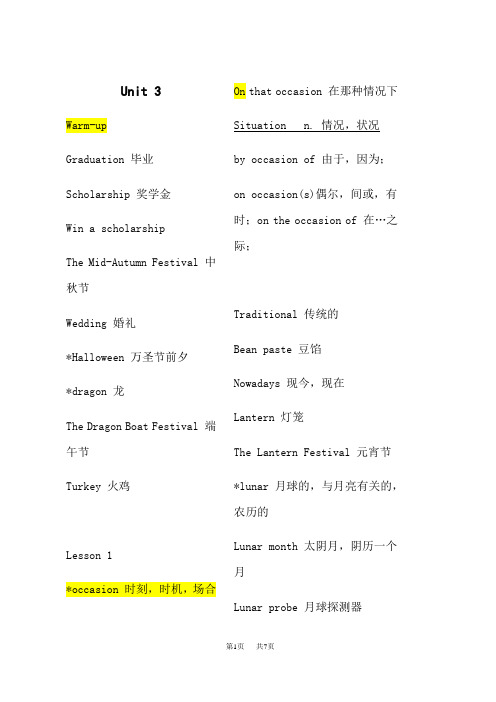
Unit 3Warm-upGraduation 毕业Scholarship 奖学金Win a scholarshipThe Mid-Autumn Festival 中秋节Wedding 婚礼*Halloween 万圣节前夕*dragon 龙The Dragon Boat Festival 端午节Turkey 火鸡Lesson 1*occasion 时刻,时机,场合On that occasion 在那种情况下Situation n. 情况,状况by occasion of 由于,因为;on occasion(s)偶尔,间或,有时;on the occasion of 在…之际;Traditional 传统的Bean paste 豆馅Nowadays 现今,现在Lantern 灯笼The Lantern Festival 元宵节*lunar 月球的,与月亮有关的,农历的Lunar month 太阴月,阴历一个月Lunar probe 月球探测器Celebration 庆祝,庆典Celebrate v. 庆祝Power 控制力,权力Powerful adj. 有力量的Have the power to do sth. 有能力做某事Darkness 黑暗,漆黑Destroy 破坏,毁坏Burn down 烧毁Decorate 装饰,布置Decorate...with...用...装饰...Battery 电池Sweet dumpling 元宵Boil v. 煮沸,沸腾Serve 提供(食物),端上(饭菜)Service n. 服务Servant n. 奴隶,仆人Serve sth to sb. 给某人端上Serve as... 作为...招待Tradition 传统,惯例Take part in 参与,参加Attend v. 参加*sticky 粘的,粘性的Stick v. 粘N.棍子Stick to doing sth. 坚持做某事Lesson 2Alcohol 酒,酒精Hot pot 火锅*snack 小吃,快餐Reception n.接待,招待会Receive v.收到Accept v. 接受Retire v. 退休retirement n.Retire from 从...退休Retire...as...作为...退休Salary 薪水Apply v. 申请apply to sb. For sth. 向某人申请某物v. 应用 application n. 应用Apply for 请求,申请*opportunity 机会 = chance Have an opportunity/a chance to do sth.Teenager (13-19岁之间的)青少年Depend on 依据,根据on one’s own 独立地Smartly 潇洒地,漂亮地On time 准时In time 及时Bunch 串,束Congratulation 祝贺Congratulate sb. on sth. 向某人祝贺某事Lesson 3Bride 新娘Bridegroom新郎Best man 男傧相C eremony 典礼,仪式Entrance 入口enter v. 进入The entrance to... ...的入口Invitation 请柬,邀请invite v.an invitation to... ...的一个邀请Even if 即使Attend 出席,参加Attend to sth. 专心,照料Attendance n. 参与*Indonesian 印度尼西亚的Indonesia n. 印度尼西亚Ought 应当,应该Contribute 捐献,贡献Contribute...to/towards (doing) sth. ...把...贡献给...Make a contributionto/towards doing sth.为...做贡献*Greek 希腊的,希腊人的*crown 花冠,王冠*ribbon 缎带,丝带Link v./n.连接Link...to...把...连接到...Lesson 4*carol (尤指)圣诞节颂歌Stocking 长筒女袜Seriously 认真地,真诚地Take sth. seriously 认真对待...Be serious about doing sth. 对做某事是认真的Pole 极;棒,竿The north pole 北极Envelope 信封*calendar 日历Put up 张贴,竖起,建造Decoration 装饰,装饰品*pudding 布丁Breast (鸟的)胸脯肉;胸部Swallow v. 吞下,咽下Adult 成年人Carry on 继续,坚持 = go on =continue Carry on with sth. 继续某事Carry on doing sth. 继续做某事Merry 高兴的,愉快的Communication workshop Production n. 生产,制造Produce v. 生产Producer n. 生产商Needle 针Pillow 枕头As well 也As well as 和(就远原则)My mother as well as I__goes___shopping.Mat 垫子Litre 升,公升Fry 用油煎,用油炸Fried adj. 油炸的Unfortunately 不幸地Fortune n. 财富Mess v./n. 混乱,脏乱Make a mess 一团糟Mess up 把...弄乱Vocabulary in the song Silver 银子Screen 银幕,屏幕Lowdown 卑鄙的,卑劣的Rebel v. 造反,反叛Rebellion n. 叛乱,造反Even if 即使Hop 单脚跳Auto shop 自动售货店Stupid 愚蠢的Identify (with)同情,理解,确认Identification n. 识别,证明,证件Admire v.羡慕,钦佩admiration n. 羡慕依靠这次机会 depend on this opportunity祝贺他考试及格 congratulate him on passing the exam获得奖学金 win a scholarship 毕业典礼 graduation ceremony 用影星的照片来装饰 be decorated with pictures of film stars给这个年轻人做手术operate on the young man 和奖学金有密切的关系 be related closely to the scholarships穿着正式的衣服 be dressed in formal clothes时不时地向后看 look behind from time to time。
北师大版高一英语必修第三册(2019版)Unit1_Lesson3_导学案(1)
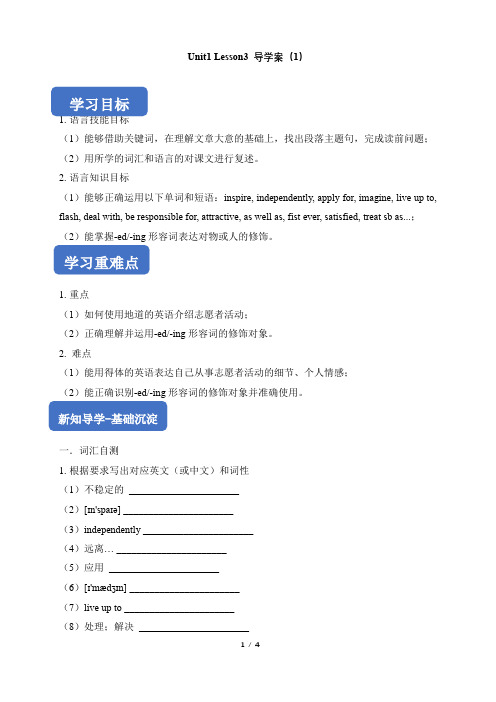
Unit1 Lesson3 导学案(1)学习目标1.语言技能目标(1)能够借助关键词,在理解文章大意的基础上,找出段落主题句,完成读前问题;(2)用所学的词汇和语言的对课文进行复述。
2.语言知识目标(1)能够正确运用以下单词和短语:inspire, independently, apply for, imagine, live up to, flash, deal with, be responsible for, attractive, as well as, fist ever, satisfied, treat sb as...;(2)能掌握-ed/-ing形容词表达对物或人的修饰。
学习重难点1.重点(1)如何使用地道的英语介绍志愿者活动;(2)正确理解并运用-ed/-ing形容词的修饰对象。
2. 难点(1)能用得体的英语表达自己从事志愿者活动的细节、个人情感;(2)能正确识别-ed/-ing形容词的修饰对象并准确使用。
新知导学-基础沉淀一.词汇自测1.根据要求写出对应英文(或中文)和词性(1)不稳定的______________________(2)[ɪn'spaɪə] ______________________(3)independently ______________________(4)远离… ______________________(5)应用______________________(6)[ɪ'mædʒɪn] ______________________(7)live up to ______________________(8)处理;解决______________________(9)对…负责______________________(10)first ever ______________________(11)charity ______________________(12)联系;联络______________________(13)把…当做… ______________________(14)flash ______________________(15)[ə'træktiv] ______________________二.语法自测1. 单项选择(1)Laws that punish parents for their little children’s actions against the laws get parents _____.A. worriedB. to worriedC. worryingD. Worry (2)The little boy isn’t getting on well in maths and worse still, he is even unwilling to go to school. With her son _____, she feels very ______.A. disappointing; worryingB. disappointing; worriedC. disappointed; worriedD. disappointed; worrying(3)After the Anti-terrorist War, the American soldiers returned home,______.A. safe but tiredB. safely but tiredC. safe and tiringD. safely and tiring(4)As we all know, typing is a ______ job to a ______ heart.A. tired; tiredB. tired; tiringC. tiring; tiredD. tiring; tiring(5)Poor boy! His________ looks and ________hands suggested he was very afraid.A. frightful; tremblingB. frightened; tremblingC. frightening; trembledD. frightened; trembly2.用词的适当形式填空(1)His ______________ question made me ____________ greatly. (embarrass)(2)He was _________ at the ________ news, so there was a ___________ look on his face.(disappoint)(3)We were all____________ at his __________ experience in South Africa. (amaze)(4)Jane is __________ because her job is ___________, which __________ her parents. (bore)(5)We were deeply ___________ by his performance. That is to say, his performance left a deep ____________ on us.(impress)三.综合自测1. 语法填空Zhang Tian graduated (1)_________ university and got a teacher’s certificate last year. His parents wanted him to get a good job in Shanghai. But he (2)_________ (inspire) by the idea of living independently away from home. So he applied (3)_________ and became a volunteer teacher in a village school. Bringing with him lots of books, clothes, and two pairs of trainers, Zhang Tian travelled to the village with (4)________ eager heart. He imagined all sorts of exciting things about living and teaching in a village.However, not everything lived up to Zhang Tian’s hopes. The school was much (5)________ (small) than he expected, with only three classrooms. In front of the classrooms, there was a playground (6)_______ got dusty on windy days and muddy on rainy days. Living in the village was also more challenging than he had thought. The power and water supplies (7)_______ (be) unstable, so he could only shower every three or four days, and he had to learn how (8)__________ (cook). The thought of leaving once flashed through his mind, but he quickly gave up the idea and found ways to deal with the challenges.The school had just three teachers and Zhang Tian was the only English teacher. The other two local teachers were (9)_________ (response) for maths and Chinese. To make school life healthier and livelier for his students, Zhang Tian introduced more subjects to the school — music, art and PE. It is not (10)_________ (surprise) that PE is the kids' favourite subject! Their school lives are now more attractive and interesting, and they enjoy playing football in the playground, as well as singing songs they’ve learnt.【答案】1. 单选ABACB2. 用括号里给的单词的适当形式填空(1) embarrassing, embarrassed(2) disappointed, disappointing, disappointed(3) amazed, amazing(4) bored, boring, bores(5) impressed, impression。
北师大版高一英语Vocabulary of unit 3 lesson 3
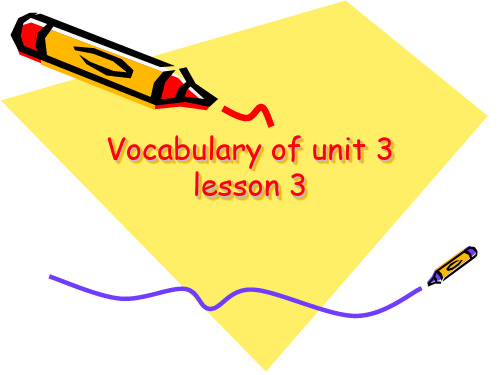
• • • • • • • • • •
5. ought to+ do sth. 应该做某事 ought to 情态动词 动词原型 情态动词+动词原型 You ought to buy a new bike. 你应该买一辆新的自行车。 你应该买一辆新的自行车。 否定句: 否定句: Sb. ought not to/oughtn’t (to) do sth. 疑问句: 疑问句: Ought sb. (to) do sth? Yes, sb. ought. No, sb. oughtn’t (to).
• invite [in‘vait] v. 邀请 • invite sb. for sth. • I've invited the Smiths round for drinks next Friday. • 我已邀请史密斯一家下周五来家中小酌。 我已邀请史密斯一家下周五来家中小酌。 • invite sb. to +地点 地点 • 我请他这个周末到我家。 我请他这个周末到我家。 • I invite him to my home this weekend. • 比较:invent 发明 比较:
• attendance [ə‘tendəns] n. 出席 • He didn't have perfect attendance this year. • 他今年有缺勤。 他今年有缺勤。 • Attendance at school is demanded by law. • 法律规定儿童必须上学。 法律规定儿童必须上学。
Vocabulary of unit 3 lesson 3
• • • • • • • • •
1. entrance [in‘trɑ:ns] n. 入口 ɑ 他已经通过了大学的入学考试。 他已经通过了大学的入学考试。 He had passed the entrance examination of the college. Entrance of/to …的入口 的入口 明天我会在动物园的入口处和你见面。 明天我会在动物园的入口处和你见面。 I‘ll meet you at the entrance of/to the zoo tomorrow. enter ['entə] v. 进入 进入, 进来前请先敲门。 进来前请先敲门。 Please do not enter before knocking on the door.
北师大版英语高一上册Module1Unit3Celebration(lesson1)
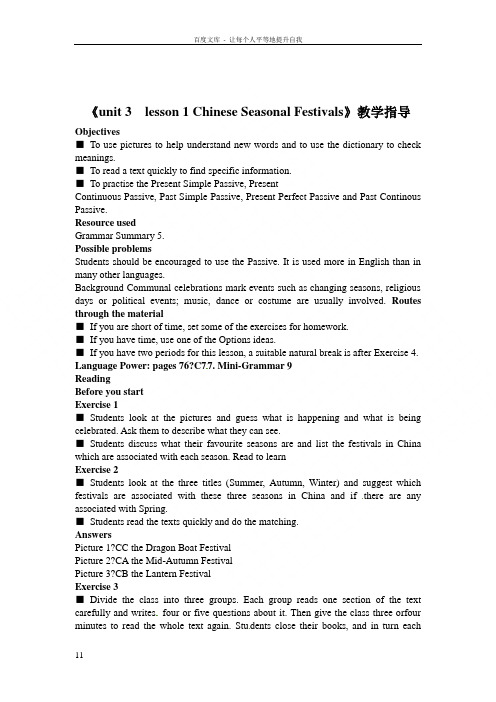
《unit 3 lesson 1 Chinese Seasonal Festivals》教学指导Objectives■To use pictures to help understand new words and to use the dictionary to check meanings.■To read a text quickly to find specific information.■To practise the Present Simple Passive, PresentContinuous Passive, Past Simple Passive, Present Perfect Passive and Past Continous Passive.Resource usedGrammar Summary 5.Possible problemsStudents should be encouraged to use the Passive. It is used more in English than in many other languages.Background Communal celebrations mark events such as changing seasons, religious days or political events; music, dance or costume are usually involved. Routes through the material■If you are short of time, set some of the exercises for homework.■If you have time, use one of the Options ideas.■If you have two periods for this lesson, a suitable natural break is after Exercise 4. Language Power: pages 76?C77. Mini-Grammar 9ReadingBefore you startExercise 1■Students look at the pictures and guess what is happening and what is being celebrated. Ask them to describe what they can see.■Students discuss what their favourite seasons are and list the festivals in China which are associated with each season. Read to learnExercise 2■Students look at the three titles (Summer, Autumn, Winter) and suggest which festivals are associated with these three seasons in China and if there are any associated with Spring.■Students read the texts quickly and do the matching.AnswersPicture 1?CC the Dragon Boat FestivalPicture 2?CA the Mid-Autumn FestivalPicture 3?CB the Lantern FestivalExercise 3■Divide the class into three groups. Each group reads one section of the text carefully and writes four or five questions about it. Then give the class three orfour minutes to read the whole text again. Stu dents close their books, and in turn eachgroup asks its questions for the rest of the class to answer.■Students read the text again and fill in the table with the t ext information they get. ■Have students check their answers in pairs.■Encourage students to add another festival they know well.■Students read the questions and find the answers in the texts by reading the texts again.■Have students talk about their festival in pairs.AnswersPassage A:the Mid-Autumn Festival, Septe mber or October, moon cakesPassage B:the Lantern Festival, the fifteenth of the first month of the lunar calendar, sweet dumplingsPassage C:the Dragon Boat Festival, the fifth day of the fifth month of the lunar calendar, Zongzi Exercise 4■Students discuss in pairs and tell the class their opinions.Language Power: the Word Corner on page 79 givesfurther practice in vocabulary (clothes).GrammarTHE PASSIVE (I)Exercise 5■Students identify that the passive is used when we don’t know or there is no need to say who the “doer” of an action is.■Students then do the exercise, finding the sentences in the text and completing the verbs.■Refer students to Grammar Summary 5 to make sure they understand how to use the Passive correctly.■For further practice, ask students to answer questi ons about their school (or town), . “When are school examinations held?When are school reports written? Where is football played?When are bells rung? When was this classroom cleaned? When was this school built?”Answers1. are ma de2. were,organizedExercise 6■ Have students look at the given sentences and a sk them what tenses are used in them.■ Encourage students to draw rules for the formation of the passive forms. Ask them to refer Grammar Summary 1,3,4 and 5 on pages 92?C93.Answers1. has been arranged2. is being collected3. was being paintedExercise 7■ Ask students if they have heard of the Water Festival.■ Stud ents read the text to find out about the festival. Then read the text again and complete the verbs.Answers1. is celebrated2. is splashed3. are carried4. are told5. is related6. are washed7. are raced 8. are launched■ Have students close their books and ask them to say what they can remember about the festival.Exercise 8■ Students work in pairs, changing the sentences into the passive. Answers1. My health is being affected by stress.2. People are being moved out of the houses.3. The mini-helicopter has already been invented by him.4. The forest fire has been put out by them.5. The car was being repaired when I got there.6. The house was being decorated when the accident happenedVocabularyExercise 9■ Students may need to go back to the text to review the words before they start filling in the blanks.Answers1. is lit2. has decorated3. mark4. celebrate5. was included6. was burnt down7 take part in 8. be boiledLanguage in UseExercise 10■ Students work in groups, writing out the questions andadding more of their own questions using the Passive. Tell students they must know the answers to their questions. If you wish, they can finish the questions for homework and use reference sources to check their answers. Each group should have between 10?C15 questions.Answers1. Where is the Mid-Aut umn Festival celebrated? (In China)2. Where is “zongzi” eaten? (In C hina)3. When is the Lantern Festival celebrated? (In China)4. Who was the telephone invented by? (By Alexander Graham Bell)5. Who was Romeo and Juliet written by? (By William Shakespeare)6. Where are BMW cars made? (In Germany)OptionsPracticeIn groups, students prepare a written description of SpringFestival in China. Tell students they are writing for English speaking readers who have not visited China. Students can follow the structure of the texts in the coursebook and, if possible, illustrate their text with a suitable drawing or photograph. When the groups have finished, they can exchange papers for others to read. ExtensionStudents, working individually or in p airs, carry out a research project (using refe rence books or the Internet) to find out about a seasonal festival in another country. Students then prepare a short talk about this festival to give to the class.。
北师大版高一英语必修第三册(2019版)Unit1_Lesson1_导学案(2)
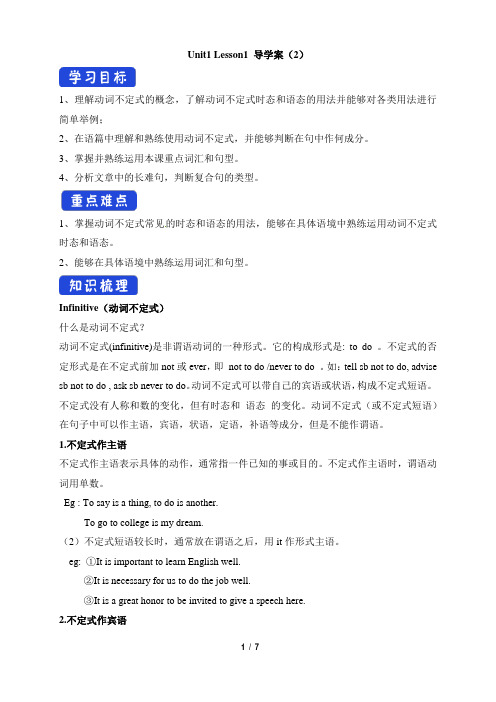
Unit1 Lesson1 导学案(2)1、理解动词不定式的概念,了解动词不定式时态和语态的用法并能够对各类用法进行简单举例;2、在语篇中理解和熟练使用动词不定式,并能够判断在句中作何成分。
3、掌握并熟练运用本课重点词汇和句型。
4、分析文章中的长难句,判断复合句的类型。
1、掌握动词不定式常见的时态和语态的用法,能够在具体语境中熟练运用动词不定式时态和语态。
2、能够在具体语境中熟练运用词汇和句型。
Infinitive(动词不定式)什么是动词不定式?动词不定式(infinitive)是非谓语动词的一种形式。
它的构成形式是: to do 。
不定式的否定形式是在不定式前加not或ever,即not to do /never to do 。
如:tell sb not to do, advise sb not to do , ask sb never to do。
动词不定式可以带自己的宾语或状语,构成不定式短语。
不定式没有人称和数的变化,但有时态和语态的变化。
动词不定式(或不定式短语)在句子中可以作主语,宾语,状语,定语,补语等成分,但是不能作谓语。
1.不定式作主语不定式作主语表示具体的动作,通常指一件已知的事或目的。
不定式作主语时,谓语动词用单数。
Eg : To say is a thing, to do is another.To go to college is my dream.(2)不定式短语较长时,通常放在谓语之后,用it作形式主语。
eg: ①It is important to learn English well.②It is necessary for us to do the job well.③It is a great honor to be invited to give a speech here.2.不定式作宾语(1)to do表示特定,具体,将来的动作。
常只用不定式作宾语的动词(want,wish,hope,long,expect,desire,intend,decide,ask,promise,aim,offer,agree,plan,learn,cho ose,refuse,fail,manage,pretend等。
- 1、下载文档前请自行甄别文档内容的完整性,平台不提供额外的编辑、内容补充、找答案等附加服务。
- 2、"仅部分预览"的文档,不可在线预览部分如存在完整性等问题,可反馈申请退款(可完整预览的文档不适用该条件!)。
- 3、如文档侵犯您的权益,请联系客服反馈,我们会尽快为您处理(人工客服工作时间:9:00-18:30)。
• • • • • • • • •
including [in‘klu:diŋ] prep. 包含 包括 包含,包括 including sth. They have many pets, including three cats. 他们有很多宠物, 猫就有三只. 他们有很多宠物 猫就有三只 included [in‘klu:did] a. 包括的 内藏的 包括的, Sth. included They have many pets, three cats included. 五个学生考试没有及格,其中包括李平。 五个学生考试没有及格,其中包括李平。 Five students failed in the examination, Liping included/including Liping.
• 2. traditional [trə‘diʃə ʃən(ə)l] a. 传统的 ʃə • Do you believe in Chinese traditional medicine? • 你相信中国传统的中药吗? 你相信中国传统的中药吗? • traditionally [trə'diʃə ʃənəli] ʃə • ad. 传统上 照惯例 传统上,照惯例 • In America traditionally the college senior class gives a ball each spring. • 按传统,美国大学高年级学生每年春季举办 按传统, 大型舞会。 大型舞会。
• 6. power [‘pauə] n. 力量 势力 动力 力量,势力 势力,动力 • 坐在这里,你可以感到太阳的力量。 坐在这里,你可以感到太阳的力量。 • Sitting out here, you really can feel the power of the sun. • powerful ['pauəful] a. 强有力的 • 俄国曾是一个非常强大的国家。 俄国曾是一个非常强大的国家。 • Russia used to be a very powerful country. •
• 9. burn down vt. 烧成平地 烧毁 烧光 烧成平地(烧毁 烧光) 烧毁,烧光 • The house was burnt down in half an hour. • 那所房子在半小时之内就被焚为平地 那所房子在半小时之内就被焚为平地.
• • • • • • • • •
10. decorate [‘dekəreit] v. 装饰 装修 装饰,装修 我们装饰房屋过圣诞节。 我们装饰房屋过圣诞节。 We decorated the house for Christmas. decorate…with… 用…装饰 装饰… 装饰 她用鲜花装饰她的房间。 她用鲜花装饰她的房间。 She decorated her room with flowers. decoration [dekə'reiʃə ʃən] n. 装饰 装饰品 装饰,装饰品 ʃə 她在圣诞树上放了一些装饰品。 她在圣诞树上放了一些装饰品。 She put some decorations on the Christmas tree.
• I’m sure you’ll all join me in thanking today’s speaker. • 我相信大家愿意和我一起向今天的演讲者致 谢。 • attend v.参加 参加 • attend a meeting/conference/class party/celebration/reception • attend college/church/school • 我会参加会议。 我会参加会议。 • I shall be attending the meeting. • Join 参加(组织) 参加(组织) • He joined the Party yesterday.
• • • • • • • •
端上, 端上,送上 他为孩子们拿来糖果。 他为孩子们拿来糖果。 He served some sweets to the children. 早饭一直供应到9点 早饭一直供应到 点。 Breakfast is served until 9 am. service ['sə:vis] n. 服务 服务, 这家旅馆饭菜很好,但服务很差。 这家旅馆饭菜很好,但服务很差。 The food is good at this hotel, but the service is poor.
• 11. serve [sə:v] v. 服务 • She has served the family faithfully for thirty years. • 她为这个家忠心耿耿地操劳了 年。 她为这个家忠心耿耿地操劳了30年 • 我们应该为人民服务。 我们应该为人民服务。 • We should serve the people. • He has served in the army for three years. • 他已在部队服役三年。 他已在部队服役三年。
• 8. destroy [dis‘trɔi] v. 破坏 毁坏 破坏,毁坏 ɔ • destroyed -destroyed -destroying -
destroys
• If the tree falls that way, it will destroy the house. • 这棵树向那边倒下就会把那所房子压坏。 这棵树向那边倒下就会把那所房子压坏。 • An earthquake would destroy a city. • 地震能摧毁一座城市。 地震能摧毁一座城市。 • destruction [dis‘trʌkʃə ʃən] n. 破坏 毁灭 破坏,毁灭 ʌ ʃə • The destruction of these big forests could have serious ecological results. • 这些大森林的毁坏会带来生态上的严重后果。 这些大森林的毁坏会带来生态上的严重后果。
Vocabulary of unit 3 lesson 1
• • • • • • • • •
1. occasion [ə‘keiʒәn] n. 场合 I only wear a tie on special occasions. 我只在特殊场合才打领带。 我只在特殊场合才打领带。 occasional [ə‘keiʒnəl] a. 偶然的 不时的 偶然的,不时的 He is only an occasional workman. 他只是个临时雇工。 他只是个临时雇工。 occasionally [ə'keiʒәnəli] ad. 偶尔地 她偶尔不得不吃安眠药。 她偶尔不得不吃安眠药。 Occasionally she had to take sleeping pills.
• 13. sticky ['stiki] a. 粘的 粘性的 粘的,粘性的 • I am uncomfortable because my body is sticky. • 我身上粘粘的,很不舒服。 我身上粘粘的,很不舒服。
• 12. take part in 参加 活动 参加(活动 活动) • How many athletes took part in the competition? • 有多少运动员参加了比赛? 有多少运动员参加了比赛? • 年轻时他积极参加政治活动。 年轻时他积极参加政治活动。 • He took an active part in political activities when he was young. • join (sb) in sth/doing sth.和某人一起参加 和某人一起参加 (活动 活动) 活动 • Can I join in (the game)? • 我参加(这个游戏)行s [‘nauədeiz] ad. 现今 现在 现今,现在 • 现今,移动电话非常普及。 现今,移动电话非常普及。 • Portable telephones are very popular nowadays. • 4.include [in‘ klu:d] v. 包括 包含 包括,包含 • My job doesn't include making coffee for the boss! • 为老板煮咖啡不是我份内的事! 为老板煮咖啡不是我份内的事! • 请把我列入名单中。 请把我列入名单中。 • Please include me in the list.
• • • • • • • •
5. celebration [seli'breiʃə ʃən] ʃə n. 典礼 庆祝会 典礼, A wedding is an occasion for celebration. 婚礼是欢庆的时刻. 婚礼是欢庆的时刻 hold a celebration 举行庆祝会 in celebration of 为庆祝 为庆祝… 我们要举行庆祝会,庆祝他从太空回来。 我们要举行庆祝会,庆祝他从太空回来。 We’ll hold a celebration in celebration of his return from the space.
• • • • • •
7. darkness [‘dɑ:knis] n. 黑暗 ɑ The cat's eyes glowed in the darkness. 猫的眼睛在黑暗中发亮。 猫的眼睛在黑暗中发亮。 dark [dɑ:k] a. 黑暗的 ɑ 有些小孩怕黑夜。 有些小孩怕黑夜。 Some children are afraid of the dark night. • It's a dark and moonless night. • 这是一个黑暗无月的夜晚。 这是一个黑暗无月的夜晚。
• celebrate [‘selibreit] v. 庆祝 祝贺 颂扬 庆祝,祝贺 祝贺,颂扬 • 我们去教堂庆祝圣诞前夕。 我们去教堂庆祝圣诞前夕。 • We went to the church to celebrate Christmas Eve. • 他们要举办晚会来庆祝他们的胜利。 他们要举办晚会来庆祝他们的胜利。 • They will hold a party to celebrate their victory. • 比较:celebrate sth. 比较: • congratulate sb. • We congratulated him on his birthday. • 我们向他庆祝生日。 我们向他庆祝生日。
